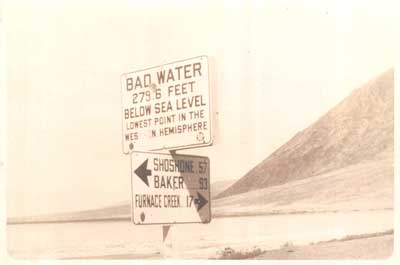The Rainmakers
By Charles CohonMy father, Harold Cohon, a retired manufacturers’ representative who celebrates his 91st birthday this month, served in the U.S. Army during World War II. In 1943 basic training brought him to Death Valley in eastern California, and we recently came across this photo he took at that signpost.
Death Valley is the hottest location in North America, setting its record 134°F temperature in 1913. It is also the driest location in North America, averaging just two inches of rain per year. Based on what Dad saw, the only thing that seemed to grow reliably there was cracks in the parched desert floor.
What Dad and most other people didn’t know is that Death Valley wasn’t really dead at all; it was just waiting for one final ingredient to show exactly what it was capable of.
It turns out that the earth in Death Valley is nutrient-rich and well-mixed with dormant seeds of flowering plants, all of the elements needed to support a vibrant ecosystem — except for one. Unknown to Dad, Death Valley was just waiting for water to show its amazing potential.
That potential revealed itself in 2005, when six inches of rain fell suddenly on Death Valley. Just as suddenly, this super-desert burst forth with an amazing variety of multi-colored flowering plants. Then, gradually, the water from that fluke rain evaporated. The desert dried up again, the plants died, and Death Valley went back to being the parched, cracked wasteland my father still remembers.
What can manufacturers and manufacturers’ representatives learn from the example of Death Valley?
An otherwise well-run manufacturing firm can be just like Death Valley. If all of the elements of a thriving ecosystem exist except one, nothing blooms. It is not a coincidence that the most successful manufacturers’ representatives are called rainmakers.
When professionally executed sales calls, like the rain, are added to the mix, a commercial ecosystem can thrive.
And removing that rain can destroy that thriving ecosystem, turning it into dust that will quickly blow away. A reminder that the excitement over harvesting a single, unexpected, wildly successful bloom should not be taken as a cause to fire the rainmakers.


